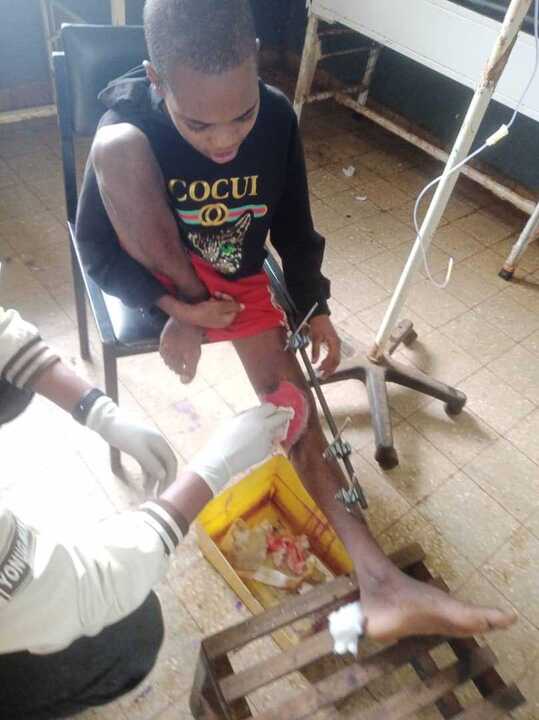Wargicha Buchuka Mokkona, 12, has a promising future but is unable to attend school today because he is recovering from a gunshot wound inflicted by Ethiopian security forces. Wargicha’s family is having financial difficulty paying for his medical care.
Wargicha was born and raised in Guji Zone, Wadera Woreda, at a place called Hanchoka Boko. He helps his family while attending grade two.
The nearest relative of Wargicha claims that the boy was severely injured by a heavy weapon shot by Ethiopian security personnel from three kilometers away. Three days prior, the government security forces and the OLA engaged in a fierce skirmish that ended in a draw. On the second day, the government security personnel searched the area but discovered no sign of the OLA militants. On the third day, the security forces opened fire in various directions, including toward Borena, Handoya Hanchoka, and Hando Haro, despite the fact that there were still no signs of OLA militants.
When Wargicha was going home after tending to his family’s cattle, he heard the gunfire from the direction of Hanchoka Boko and tried to hide beneath the edge of his house. However, he was hit before he could find safety. At that very moment, eight members of his family were hiding inside the house from the same attack.
Wargicha was shot in his knee, and the burn from the bullet seared off his flesh. The injury was very deep, and he has been treated in the hospital for the last two months. Because he couldn’t get a transfusion that matches his blood type (O), he struggled to get treatment in his district. Even though his family moved him to government medical facilities in Adola and Kuyera to get better medical care, they couldn’t get any. Finally, they were forced to go to a private medical clinic in Shashemene where they had to pay a larger fee.
According to Wargicha’s relatives, the family has paid around a half million Ethiopian Birr so far. Had Wargicha received treatment from the public medical facilities, the medical costs would have been cut at least by half.
After receiving medical treatment in Shashemene, his wound is currently being cleaned every two days at a local clinic. Since the medical facility is a bit far from their residence, his family members were forced to rent a house nearby. The victim’s family is already in a precarious position because of a drought in the area, and now they have to sell their property in order to pay for Wargicha’s medical care. Meanwhile, they are pleading with the community for assistance. However, due to what the community is experiencing more broadly, the locals are no longer assisting Wargicha’s family.
OLLAA’s source claims that despite the fact that local authorities are aware of the occurrence, none of them are providing assistance. Local authorities even claim that some members of the community are backing the OLA combatants, and therefore, they are delighted that Wargicha is suffering from an injury inflicted upon him by the government security forces.
The informant further stated: “We are suffering from a fight between the two forces and couldn’t get peace for the past three years. The community in the area is hungry for peace more than anything. Therefore, we want both the international community and stakeholders who could put pressure including the community to stop the fight between the OLA and government forces and return peace to the community.”
International Law
Ethiopia is a state party to different international human rights and humanitarian laws including the UDHR, ICCPR, ACHPR, the Four Geneva Conventions, and the FDRE Constitution. Furthermore, there are basic principles of International Humanitarian Laws with the status of customary international humanitarian laws such as:
- the distinction between civilians and combatants,
- the prohibition of attacks against those hors de combat,
- the prohibition on the infliction of unnecessary suffering,
- the principle of proportionality, and
- the notion of necessity.
The action taken by Ethiopian security forces goes both against the laws and the aforementioned basic IHL principles. Therefore, the Ethiopian government must take responsibility as a state party.
Furthermore, a civilian who gets injured due to the attack inflicted by government security forces must get the necessary medical treatment. We thus implore the Ethiopian government to assist Wargicha and other civilians who are suffering as a result of the state security forces’ irresponsible use of force.


